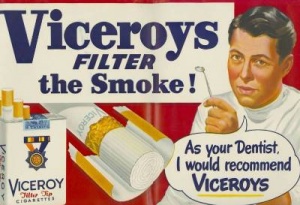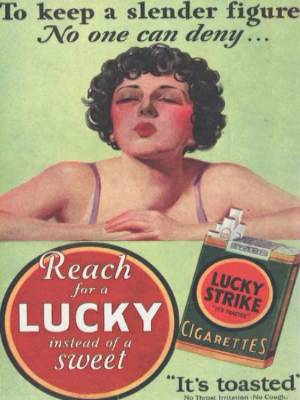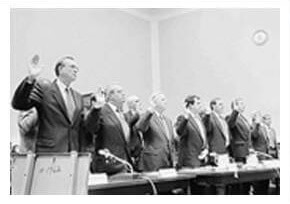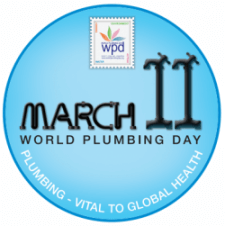January 11 is Cigarettes are Hazardous to Your Health Day
Today is Cigarettes are Hazardous to Your Health Day. Today, this may elicit a resounding,” Duh!” But on January 11, 1964, when Surgeon General Luther L. Terry, M.D. released his report linking smoking to cancer, it was far from accepted wisdom and vehemently disputed by tobacco companies.
The report came after a year-long, comprehensive review by a committee of experts of 7,000 scientific articles about the effects of smoking. Terry chose to release it on a Saturday to minimize any effect on the stock market and maximize coverage in the Sunday papers.
Twenty years later, Terry recalled that the report “hit the country like a bombshell. It was front page news and a lead story on every radio and television station in the United States and many abroad.” Later it was ranked among the top news stories of 1964.
Smoking and Health: Report of the Advisory Committee to the Surgeon General revealed cigarette smoking was responsible for a 70 percent increase in the mortality rate of smokers versus non-smokers. It estimated that average smokers had a nine- to ten-fold risk of developing lung cancer compared to non-smokers; heavy smokers, more than twenty-fold. The risk rose with the duration of smoking and diminished after cessation.
The report also named smoking as the most important cause of chronic bronchitis and pointed to a correlation between smoking and emphysema, and smoking and coronary heart disease. It noted that smoking during pregnancy reduced the average weight of newborns.
On one issue the committee balked: nicotine addiction. It insisted that the “tobacco habit should be characterized as an habituation rather than an addiction,” in part because the addictive properties of nicotine were not yet fully understood.
While the 1964 report lacked concrete recommendations, it had an impact on public attitudes and policy. A Gallup poll conducted in 1958 found that only 44 percent of Americans believed smoking caused cancer, while 78 percent believed so by 1968. In the course of a decade, it had become common knowledge that smoking damaged health, and mounting evidence of health risks gave Terry’s 1964 report public resonance.
Here is a brief, incomplete chronology of events and efforts made to combat tobacco and the companies that peddle it.
Cigarettes in U.S. History
- 1913 –R. J. Reynolds launched Camel, the first modern mass-produced cigarette made from blended tobacco.
- 1917 –Free cigarettes were included in the field rations of many American soldiers in World War I.
- 1928 –Doctors Herbert L. Lombard and Carl R. Doering offered the first detailed statistical data showing a higher proportion of heavy smokers among lung cancer patients than among controls.
- 1938 –Raymond Pearl demonstrated statistically that smoking shortens life expectancy.
- 1941-45 –Tobacco was again supplied to American servicemen in World War II.
- 1946 –Doctors Alton Ochsner and Michael DeBakey published an article in Archives of Surgery linking smoking to lung cancer and citing research articles from several countries.
- 1950 –The Federal Trade Commission stated cigarette ads that highlight health benefits are deceptive.

- 1964 –Surgeon General Luther L. Terry issued Smoking and Health.
- 1965 –Congress mandated health warnings on cigarette packs.
- 1969-The Public Health Cigarette Smoking Act passed Congress, imposing a ban on cigarette advertising on television and radio after September 30, 1970.
- 1973 –Arizona passed the first state law designating separate smoking areas in public places.
- 1983 –Lung cancer surpassed breast cancer as the leading cause of death from cancer in women.

- 1987 –Congress banned smoking on all domestic flights of two hours or less; two years later smoking is banned on all domestic flights.
- 1988 –Surgeon General C. Everett Koop’s report, The Health Consequences of Smoking: Nicotine Addiction, called nicotine “a powerfully addicting drug.” In a 618-page summary of 2,000 studies, Koop declared, “It is now clear that… cigarettes and other forms of tobacco are addicting and that actions of nicotine provide the pharmacologic basis of tobacco addiction.”
- 1992 –The Environmental Protection Agency placed passive smoke on its list of major carcinogens, making it subject to federal workplace and other regulations.
*****
- 1994 –Seven tobacco company executives testified before Congress that “nicotine is not addictive.”

The televised panel, led by Representative Henry Waxman, questioned the executives for six hours.
One executive insisted that cigarettes are no more addictive than coffee, tea or Twinkies.
“The difference between cigarettes and Twinkies,” Waxman replied, “is death.”
*****
-
2006 –On August 17, 2006, U.S. District Judge Gladys Kessler issued a 1,683-page ruling holding tobacco companies liable for covering up health risks associated with smoking and for targeting children. 
The judgment ordered the companies to issue “corrective” ads admitting to the deceptive use of terms such as “light” and “low-tar,” among other things.The companies appealed for the next 11 years, claiming the findings pertained to the alleged inaccuracy of the companies’ public statements about smoking and health, not to whether anyone in the public was actually deceived by the defendants.
Perhaps the ad should simply say, “A lie is the responsibility of the person who believes it.” That’s as good a defense of callous (and profitable) disregard for human life as any we may ever hear.
-
2017 — The companies finally ran out of appeals. In December, Altria, RJ Reynolds Tobacco, Lorillard, and Philip Morris USA were forced to run ads that stated facts such as, “Cigarette companies intentionally designed cigarettes with enough nicotine to create and sustain addiction” and “More people die every year from smoking than from murder, AIDS, suicide, drugs, car crashes, and alcohol combined.”
*****
It’s clear that the work of Dr. Terry and many others greatly affected health. Since 1964, smoking rates in the United States have dropped by more than half. It’s estimated that eight million lives have been saved by tobacco control efforts — yet up to 20 million more have been lost. Until the day we all kick the habit, every day will be Cigarettes are Hazardous to Your Health Day.
![]()



 Today is National Petroleum Day, also known as Oil and Gas Industry Appreciation Day.
Today is National Petroleum Day, also known as Oil and Gas Industry Appreciation Day.